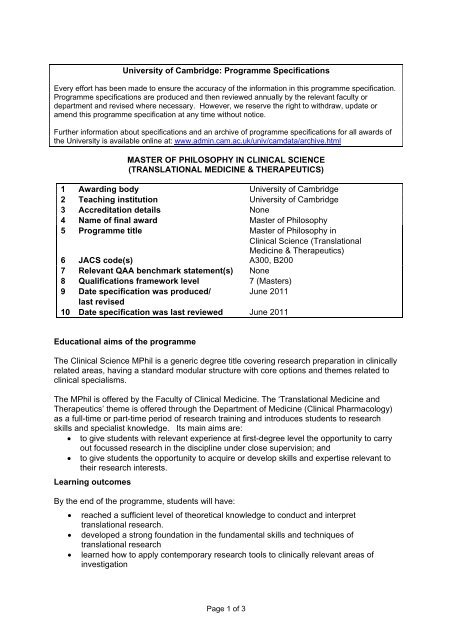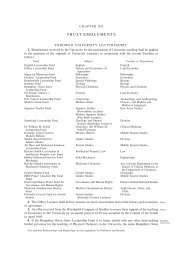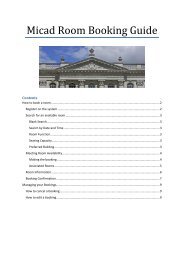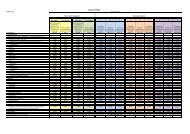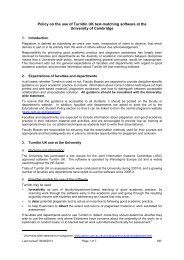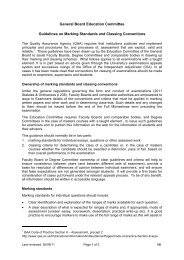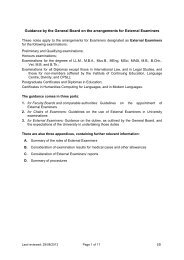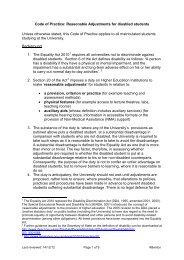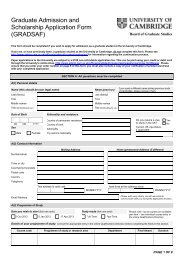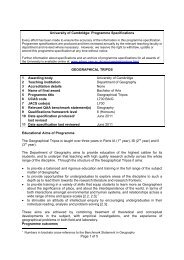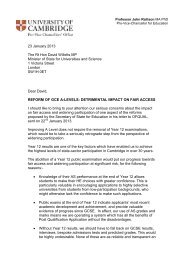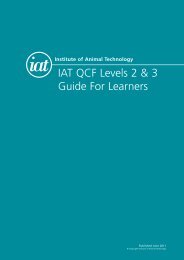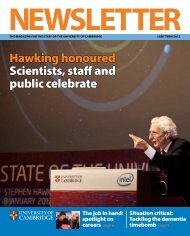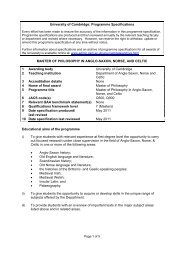Translational Medicine & Therapeutics - University of Cambridge
Translational Medicine & Therapeutics - University of Cambridge
Translational Medicine & Therapeutics - University of Cambridge
Create successful ePaper yourself
Turn your PDF publications into a flip-book with our unique Google optimized e-Paper software.
<strong>University</strong> <strong>of</strong> <strong>Cambridge</strong>: Programme Specifications<br />
Every effort has been made to ensure the accuracy <strong>of</strong> the information in this programme specification.<br />
Programme specifications are produced and then reviewed annually by the relevant faculty or<br />
department and revised where necessary. However, we reserve the right to withdraw, update or<br />
amend this programme specification at any time without notice.<br />
Further information about specifications and an archive <strong>of</strong> programme specifications for all awards <strong>of</strong><br />
the <strong>University</strong> is available online at: www.admin.cam.ac.uk/univ/camdata/archive.html<br />
MASTER OF PHILOSOPHY IN CLINICAL SCIENCE<br />
(TRANSLATIONAL MEDICINE & THERAPEUTICS)<br />
1 Awarding body <strong>University</strong> <strong>of</strong> <strong>Cambridge</strong><br />
2 Teaching institution <strong>University</strong> <strong>of</strong> <strong>Cambridge</strong><br />
3 Accreditation details None<br />
4 Name <strong>of</strong> final award Master <strong>of</strong> Philosophy<br />
5 Programme title Master <strong>of</strong> Philosophy in<br />
Clinical Science (<strong>Translational</strong><br />
<strong>Medicine</strong> & <strong>Therapeutics</strong>)<br />
6 JACS code(s) A300, B200<br />
7 Relevant QAA benchmark statement(s) None<br />
8 Qualifications framework level 7 (Masters)<br />
9 Date specification was produced/ June 2011<br />
last revised<br />
10 Date specification was last reviewed June 2011<br />
Educational aims <strong>of</strong> the programme<br />
The Clinical Science MPhil is a generic degree title covering research preparation in clinically<br />
related areas, having a standard modular structure with core options and themes related to<br />
clinical specialisms.<br />
The MPhil is <strong>of</strong>fered by the Faculty <strong>of</strong> Clinical <strong>Medicine</strong>. The ‘<strong>Translational</strong> <strong>Medicine</strong> and<br />
<strong>Therapeutics</strong>’ theme is <strong>of</strong>fered through the Department <strong>of</strong> <strong>Medicine</strong> (Clinical Pharmacology)<br />
as a full-time or part-time period <strong>of</strong> research training and introduces students to research<br />
skills and specialist knowledge. Its main aims are:<br />
• to give students with relevant experience at first-degree level the opportunity to carry<br />
out focussed research in the discipline under close supervision; and<br />
• to give students the opportunity to acquire or develop skills and expertise relevant to<br />
their research interests.<br />
Learning outcomes<br />
By the end <strong>of</strong> the programme, students will have:<br />
• reached a sufficient level <strong>of</strong> theoretical knowledge to conduct and interpret<br />
translational research.<br />
• developed a strong foundation in the fundamental skills and techniques <strong>of</strong><br />
translational research<br />
• learned how to apply contemporary research tools to clinically relevant areas <strong>of</strong><br />
investigation<br />
Page 1 <strong>of</strong> 3
• acquired an understanding <strong>of</strong> the complex issues associated with conducting sound<br />
clinical research/trials<br />
• developed the ability to be competitive in seeking support for clinical research.<br />
Teaching and learning methods<br />
Teaching methods will include, but not be limited to: formal lectures, interactive seminars and<br />
workshops, discussion and networking groups, structured reading and case analysis,<br />
laboratory work and presentation. Teaching sessions will set out concepts, conceptual<br />
frameworks and theory relating to the topics to be covered; other modes <strong>of</strong> teaching and<br />
learning are designed to enable participants to achieve the stated learning aims and<br />
objectives. All teaching sessions will have a feedback system in place for students’<br />
comments.<br />
Periods <strong>of</strong> self-directed study and research between blocks <strong>of</strong> attendance will also be<br />
required; this will be enhanced through a Virtual Learning Environment (VLE), which will<br />
enable students and tutors to consolidate and expand upon the formally taught components.<br />
Students will be expected to carry out significant in-depth research and analysis between<br />
taught sessions.<br />
Programme structure<br />
The full-time and part-time routes are exactly comparable, with the same elements, but taken<br />
over different time scales. There is to be no duplication <strong>of</strong> teaching.<br />
The full-time course takes one year (12 months). Taught modules are given in the first and<br />
third terms and the project starts in term 1, continues through term 2 and is written up in term<br />
3.<br />
The part-time course is spread over two years (24 months). Modules are taught in the first<br />
and third terms <strong>of</strong> each year and students have the option <strong>of</strong> completing the research project<br />
in terms 1-3, or terms 4-6, or split across the years. All assessments are to take place in the<br />
second year in the case <strong>of</strong> part-time students.<br />
1 Introductory course (compulsory but not assessed)<br />
2 Generic Courses; for all themes, any two <strong>of</strong><br />
2.1 Medical Statistics<br />
2.2 Practical Aspects <strong>of</strong> Clinical Research<br />
2.3 Epidemiology<br />
3 Specialist Courses (compulsory)<br />
3.1 Clinical Pharmacology<br />
3.2 Clinical Drug Development<br />
4. Research Project and dissertation (compulsory)<br />
Assessment methods<br />
The scheme <strong>of</strong> examination for the one-year full-time or two-year part-time course <strong>of</strong> study in<br />
Clinical Science for the degree <strong>of</strong> Master <strong>of</strong> Philosophy shall consist <strong>of</strong>:<br />
(a) a thesis not exceeding 15,000 words in length, including footnotes but excluding tables,<br />
appendices, and bibliography, on a subject approved by the Degree Committee for the<br />
Faculties <strong>of</strong> Clinical <strong>Medicine</strong> and Veterinary <strong>Medicine</strong>;<br />
(b) two written examinations which may cover all core subjects prescribed in the syllabus.<br />
The examination may include, at the discretion <strong>of</strong> the Examiners, an oral examination on the<br />
thesis and on the general field <strong>of</strong> knowledge within which it falls, and on the other work<br />
submitted by the candidate<br />
Page 2 <strong>of</strong> 3
The examination papers are to be taken at the end <strong>of</strong> Easter Term in June. The<br />
dissertation to be submitted on 15 August<br />
Student Support<br />
All students are members <strong>of</strong> a College as well as the Department and have access to<br />
learning support from both College and <strong>University</strong>. Each student on the MPhil is allocated a<br />
supervisor to support them throughout the course. Specialist supervisors are also available<br />
to support the students in the preparation <strong>of</strong> their dissertations. Students are also allocated a<br />
student mentor and can seek support from the MPhil Course Coordinator. There is a course<br />
handbook as well as web-based information. Library facilities are available both at the School<br />
<strong>of</strong> Clinical <strong>Medicine</strong> and at the Colleges.<br />
Students regularly complete course evaluation forms providing feedback on the quality <strong>of</strong><br />
teaching provided. This feedback is reviewed and acted on by the Course Management<br />
Committee and by teaching staff.<br />
Graduate employability<br />
The MPhil provides core training in research methods relevant to clinical research on the<br />
theme <strong>of</strong> <strong>Translational</strong> <strong>Medicine</strong> & <strong>Therapeutics</strong>. Many participants will be clinicians in<br />
training and will expect to continue on the track to becoming a Consultant, or may take a<br />
PhD as part <strong>of</strong> a route to a research career in clinical science. Others will find their<br />
employability enhanced in a variety <strong>of</strong> clinically-related areas and the pharmaceutical<br />
industry.<br />
The Careers Service maintains links with relevant employers and takes into account<br />
employer needs and opinions in the services which is provides for students. Details <strong>of</strong> its<br />
services can be found at www.careers.cam.ac.uk. The Careers Service also allocates a<br />
Careers Adviser to each College, faculty and department to act as a point <strong>of</strong> contact.<br />
Page 3 <strong>of</strong> 3


